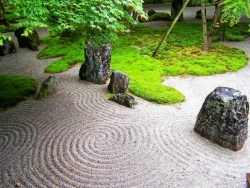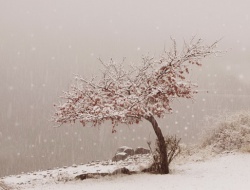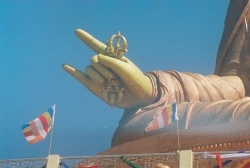The Surangama Sutra - The Sensation Skandha
"Ananda, when disciples practicing Samatha to realize Samadhi are no longer susceptible to the Skandha of form, they will see the minds of all the Buddhas like reflections in a clear mirror. But this is like winning a prize that cannot yet be enjoyed, or like a man having a nightmare, whose limbs are free and whose mind is normal, but because of an Evil influence is unable to move. Therefore, this is called 'the Skandha of sensation.' If the nightmare ceases, then the mind can leave the Body to observe one's own face and come and go as one pleases without any hindrances. This is called 'the cessation of the Skandha of sensation,' and one thus transcends contaminated views. If we examine the cause of this, it is false knowledge and erroneous thinking.
1. "Ananda, disciples at this stage of their practice will find themselves surrounded by great brightness and become aware, as a result of excessive inner self-control, of a feeling of infinite pity. As this feeling swells, they may begin to view mosquitoes and gadflies as their own infant children. With great pity in their hearts, they may find themselves spontaneously weeping. This is called 'a breakdown from the rigors of practice.' If they realize its origin, there will be no harm, and if they do not misinterpret it as sainthood, after a time it will automatically disappear. Should they confuse this with sainthood, the maras of pity will enter their minds, and they will feel great pity for people they meet and give way to uncontrolled sobbing. This abnormal reaction may cause them to fall into a lower state.
2. "Ananda, those disciples who practice Dhyana will find that as the Skandha of form recedes, the Skandha of sensation manifests. Now with the prospect of final success before them, they may feel overwhelmingly excited and develop an attitude of unlimited boldness. With a fierceness of mind and a will equal to all the Buddhas, they may proclaim that with one thought they can transcend innumerable kalpas. This is called, 'overconfidence arising from practice,' but if recognized, it will not result in harm. It is not, however, sainthood, and understanding this, after a time it will automatically disappear. If they confuse this state with sainthood, the maras of madness will enter their minds, and they will become boastful and arrogant with the people they meet, oblivious to both the Buddhas above and humanity below. This abnormal reaction may cause them to fall into a lower state.
3. "Continuing, those disciples who practice Dhyana will find that as the Skandha of form recedes, and the Skandha of sensation manifests, they will see before them no signs of progress and behind them former attainments disappear. Their intellectual capacities will weaken, and they will enter a destructive state. Turning around and seeing no hope, they may experience a sense of great mental dryness and exhaustion that leads to a state of unremitting deep reflection. If they take this as a sign of diligence in practice, this is called 'losing one's mind through Ignorance.' If they recognize these signs, there will be no harm, but if they confuse this with sainthood, the maras of unforgetfulness will enter their minds, cling fast day and night, and hold it in suspension. This is an abnormal reaction and will cause them to fall into a lower state.
4. "Continuing, those disciples who practice Dhyana will find that as the Skandha of form recedes, and the Skandha of sensation manifests, the faculty of Wisdom outstrips Samadhi. Swollen with a sense of pride, they may become convinced that they have equaled Vairocana-- the embodiment of Wisdom-- and become prematurely satisfied with this small accomplishment. This is called 'loss of common sense through overstimulation of the Power of discrimination in meditation.' If one recognizes this, there will be no harm. However, this is not sainthood, and if misinterpreted , the maras of inferiority and self-satisfaction will enter their minds, and they will announce to everyone they meet that they have already reached supreme Enlightenment. This is an abnormal reaction and will cause them to fall into a lower state.
5. "Continuing, those disciples who practice Dhyana will find that as the Skandha of form recedes, and the Skandha of sensation manifests, they will find themselves not only without further progress, but losing their previous gains. Contemplating the gulf between mortality and Nirvana, the path seems difficult and dangerous, and suddenly they feel inconsolably depressed. Feeling as if they were lying on a bed of iron or drinking poison, they may lose their will to live. They may even ask others to make an end of their Life and thus gain release from torment. This is called 'being at a loss for the appropriate method,' but is harmless if they recognize it. This is not sainthood, and if misinterpreted, the maras of constant sorrow will enter their hearts and cause them to cut their own flesh, or even take their own lives. They may also suffer prolonged depression that drives them to escape to wild places and avoid contact with other human beings. This is an abnormal reaction and will cause them to fall into a lower state.
6. "Continuing, those disciples who practice Dhyana may find that as the Skandha of form recedes, and the Skandha of sensation manifests, they will experience a feeling of purity and peace that suddenly gives rise to a sense of unlimited Joy. This exhilaration may become uncontrollable. This is called 'lightness and ease unchecked by Wisdom,' but if you recognize it, there is no harm. However, it is not sainthood, and if they misinterpret it, the maras of joyfulness will enter their minds. They may burst into laughter when they meet people and sing and dance in the streets, saying that they have gained liberation. This is an abnormal reaction and will cause them to fall into a lower state.
7. "Continuing, those disciples who practice Dhyana will find that as the Skandha of form recedes, and the Skandha of sensation manifests, they may feel that they have already reached their goal and suddenly give way to unjustified conceit. All at once they may consider themselves superior to everyone and fully victorious. They may feel unjustifiably accomplished or smug in their inferior status. In their hearts they look down on all the Buddhas; how much more so the novice sravakas and pratyeka-Buddhas! This is called 'progress without sufficient Wisdom to save oneself from pride,' but if they recognize it, there is no harm. This is not sainthood, but if they misinterpret it, the maras of pride will enter their minds. They will cause them to show disrespect for stupas and temples, to destroy sutras and images of The Buddha, and to declare to their patrons: 'These images are but gold and bronze, earth and wood; the sutras are merely tree leaves and rag fiber. Your own Body contains the eternal reality of Buddha-truth; to ignore this and instead to worship clay and wood is truly foolish.' Those who are taken in by his words may join him in destroying the images and sutras, or bury them underground. They mislead the people and will be contemned to hell. This is an abnormal reaction and will cause them to fall into a lower state.
8. "Continuing, those disciples who practice Dhyana will find that as the Skandha of form recedes, and the Skandha of sensation manifests, and in the midst of spiritual illumination and realization of the truth, they may experience a feeling of great Harmony and infinite lightness of Heart. They may feel that they have achieved sainthood and great Contentment. This is called 'comfort and purity gained through intelligence,' but if they recognize it, there is no harm. This is not sainthood, but if they misinterpret it, the maras of Craving ease and purity enter their minds, and they become self-satisfied and stop seeking further progress. The majority of these act like ignorant monks who mislead people and fall into eternal hell. This is an abnormal reaction and will cause them to fall into a lower state.
9. "Continuing, those disciples who practice Dhyana may find that as the Skandha of form recedes and the Skandha of sensation manifests, in a moment of realization they will apprehend the insubstantial and luminous nature of phenomena. In this state, suddenly they may gravitate towards a belief in absolute extinction and discard the law of causality. As they enter this void, their minds become empty to the point of believing in permanent extinction. If they recognize this in time, there is no harm. This is not sainthood, but if they misinterpret it, the maras of voidness will enter their minds, and they may ridicule the vows of monasticism or dismiss them as Hinayana. They may say that after the Bodhisattva has realized voidness, there no longer are any sins. Hence, they may even indulge in drinking, meat-eating, and licentiousness in the presence of their gullible patrons. Because of the Power of this demonic influence, they will exert
control over others, who will fail to question their genuineness. As time passes, demonic possession may lead to consuming urine and feces together with wine and meat, all under the rationale that everything shares the same voidness-nature. They violate The Buddha's rules of morality and discipline and lead others into sin. This is an abnormal reaction and will cause them to fall into a lower state.
10. "Continuing, those disciples who practice Dhyana may find that as the Skandha of form recedes, and the Skandha of sensation manifests, they will experience luminous voidness penetrating the mind and bones, and suddenly a feeling of boundless Love arises. As the feeling of Love becomes intense, they will go mad, and madness turns into Craving. This is called 'irrational desires arising from the stillness and peace of meditation.' If they recognize it, there will be no harm. This is not sainthood, but if they misinterpret it , the maras of desire will enter their minds, and they will insist that desire is the Bodhi path. They may preach the Doctrine of universal desire to laymen and that practicing sexual indulgence is called 'being a child of the Dharma.' The Power of this demonic influence will prevail during the Dharma-ending age and hundreds, thousands, and tens of thousands of ignorant people will be swayed. When the demon is weary, it will depart the victims' Body, leaving them without Power over people and exposing them to the law of the land. For deceiving others they will fall into eternal hell. This is an abnormal reaction and will cause them to fall into a lower state.
"Ananda, these ten conditions associated with the practice of Dhyana all arise from the interaction of the Skandha of sensation with the practice of meditation. When these reactions manifest, deluded people do not analyze them, nor are they able to understand the causes. They claim that they have attained sainthood and falsely proclaim their Enlightenment. For this they fall into eternal hell. You my disciples, after I pass into Nirvana, must transmit this teaching in the period of the end of The Buddha-law so that all living beings may awaken to this message. Do not allow Deva Mara to take advantage of you during meditation, but guard yourselves well as you strive to realize the supreme Tao.


